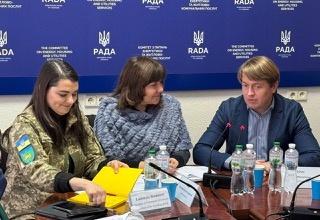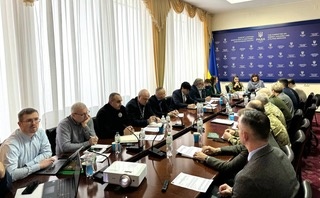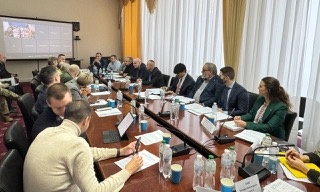Результати засідання робочої групи з розробки та парламентського нагляду за впровадженням «Національного плану дій» з реагування на CBRN загрози та відповідних регуляторних механізмів (ENGLISH VERSION)
23 січня 2024, 13:50
В Комітеті з питань енергетики та житлово-комунальних послуг під головуванням Вікторії Гриб та Людмили Буймістер відбулось установче засідання робочої групи з розробки та парламентського нагляду за впровадженням «Національного плану дій» з реагування загрози для хімічної, бактеріологічної, радіаційної та ядерної безпеки (CBRN).

Російське вторгнення в Україну, події на Близькому Сході та реакція на них свідчать про те, що ризики, пов'язані з можливими CBRN-інцидентами зростають, становлячи серйозну загрозу в міжнародному масштабі.
«Україна, перебуваючи у війні, зобов'язана не просто враховувати безпекові зміни у світі, але й готуватися до них, - зазначила Голова підкомітету з питань енергетичної безпеки Вікторія Гриб, - сьогодні починаємо працювати над вдосконаленням законодавства у сфері хімічної, бактеріологічної, радіаційної та ядерної безпеки, яке б відповідало вимогам воєнного часу. Досі чинні стандарти CBRN створювалися для мирного часу. Необхідно адаптувати їх під військові реалії».

Під час установчого засідання робочої групи було затверджено склад, положення та план роботи Робочої групи, а також ініційовано участь парламентської делегації в міжнародному форумі Глобального партнерства проти розповсюдження зброї та матеріалів масового знищення, який відбудеться в лютому в Римі.
«Основне наше завдання – напрацювати таку систему протидії загрозам CBRN, яка б дозволила унеможливити сам факт застосування бактеріологічної, хімічної та ядерної зброї», - сказала Вікторія Гриб.

До роботи залучено, зокрема, представників РНБО, Міноборони, Генпрокуратури, ДСНС, МОЗ, Міненерго.
ENGLISH VERSION
Results of the Meeting of the Working Group on the Development and Parliamentary Oversight of the Implementation of the “National Action Plan” for Responding to CBRN Threats and Relevant Regulatory Mechanisms
At the Committee on Energy, Housing and Utilities Services, the founding meeting of the Working Group on the Development and Parliamentary Oversight of the Implementation of the “National Action Plan” for Responding to Chemical, Biological, Radiation and Nuclear (CBRN) Threats was held, chaired by Viktoriia Hryb and Liudmyla Buimister.
The Russian invasion of Ukraine, the events in the Middle East and the response to them indicate that the risks associated with possible CBRN incidents are growing, posing a serious threat on an international scale.
“Being at war, Ukraine must not just take into account the security changes in the world but also prepare for them,” said Viktoriia Hryb, Head of the Subcommittee on Energy Security, “so today we are starting to work on improving the legislation in the field of chemical, bacteriological, radiation and nuclear safety, so that it will meet the requirements of wartime. The CBRN standards currently in force were created for peacetime. It is necessary to adapt them to military realities.
During the founding meeting of the Working Group, the composition, regulations and work plan of the Working Group were approved; also, the participation of a parliamentary delegation in the international forum of the Global Partnership Against the Spread of Weapons and Materials of Mass Destruction, due to be held in Rome in February, was initiated.
“Our main task is to develop such a system for countering CBRN threats that would make it impossible to use bacteriological, chemical and nuclear weapons,” said Victoria Hryb.
In particular, representatives of the National Security an Defense Council, the Ministry of Defense, the Prosecutor General’s Office, the State Emergency Service, the Ministry of Health, and the Ministry of Energy are engaged in the work.